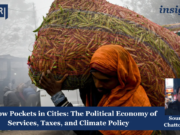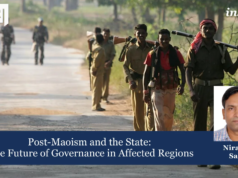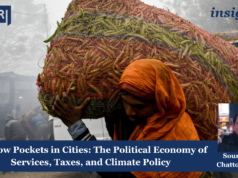Policy Update
Kiranmanonmani. Y
Introduction
‘Education is the passport to the future, for tomorrow belongs to those who prepare it for today’- Malcolm X.Education is a powerful weapon to uplift family standards within a generation. However, many students face financial barriers while pursuing courses at their preferred college. The National Overseas Scholarship Scheme was started by the Ministry of Social Justice and Empowerment, Government of India, to help students from low-income families from marginalized communities to pursue Master’s and PHD programmes from universities abroad. The Ministry of Social Justice and Empowerment is currently headed by Dr.Virendra Kumar as the Union Minister and Shri Ramdas Athawale, and Shri B.L. Verma as Ministers of State.
About the Scheme
The National Overseas Scholarship Scheme aims to provide financial assistance to low-income students from marginalized communities, including the Scheduled Castes, Denotified Nomadic and Semi-Nomadic Tribes, Landless Agricultural Labourers, and Traditional Artisans. The scholarship supports their pursuit of higher education, such as a Master’s degree or Ph.D. courses, by providing opportunities to study abroad, ultimately contributing to their economic and social upliftment. The funds are not directly disbursed to the bank accounts of the students, but they are sent to the Indian Missions abroad, which would make payments to the universities and colleges for the students. There is a 30% reservation for female students for the scholarships out of the total 125 seats.
Eligibility Criteria
There are some basic eligibility criteria for students to apply for this scholarship. That is, the student has to be from any one of these social groups: Scheduled Caste, denotified tribes, traditional artisans, and landless farmers. The age of the student should be less than 35 years, and the family income should be less than Rs. 8,00,000 per annum. The minimum percentage for an undergraduate degree should be 60%. There are 115 seats for Scheduled Castes, 6 seats for Denotified, Nomadic and Semi-Nomadic Tribes, 4 seats for Landless Agricultural Labourers, and 4 seats for Traditional Artisans, which sum up to 125 seats in total for a financial year.
Application procedure
Students are required to apply for the scholarship through the online portal with the link https://www.nosmsje.gov.in/. The selection period for the program runs from April to March each year. Applications for the first round will be accepted online through a dedicated portal, which will open for 40 days in February or March. After this initial application period, the portal will reopen for 4 days to allow candidates to make any necessary corrections to their submitted applications, ensuring that only online submissions will be considered for selection.
New Applicants are required to register through the “Candidate Registration” option available under the Main Menu on the Home Page. After that, they can fillout the form by entering their personaldetails(name, email ID, mobile number, parents’ name, state of domicile, etc.), address, emergency contact details, details of the university or college abroad for which they have applied, details of the entrance and qualifying examinations, employment status, and family income details. After filling out this information, they are required to upload the following documents:
1. Aadhaar card
2. Caste Certificate
3. Birth Certificate
4. Current Address Proof
5. Permanent Address Proof
6. High School/10th/Secondary mark sheet
7. Qualifying Degree/Provisional Certificate
8. All semester mark sheets(Combined PDF)
9. Proof of CGPA/SGPA conversion formula into a percentage (in case the percentage of marks is not given)
10. Unconditional Offer Letter from the Foreign University/Institute where applied to
11. Employer’s No Objection Certificate(NOC) Certificate (if employed)
12. Gap Certificate
13. Family Income Certificate
14. Income Tax Return (if filing ITR, combined PDF of all family members)
15. Father’s Income Certificate
16. Income Certificate
17. Spouse Income Certificate
18. Self-Income Certificate
19. Sibling or Child One Income Certificate
20. Sibling or Child Two Income Certificate
Under this scheme, several forms of assistance are provided to eligible candidates, including:
1. Tuition Fees
2. Maintenance Allowance: $15,400 annually (with a specified amount of £9,900 annually for students in the UK)
3. Contingency Funds
4. Visa Fees
5. Equipment Allowance
6. Tuition Fees and Medical Insurance Premiums
7. Air Travel: Economy class passage, following the scheme guidelines
This comprehensive support is designed to facilitate a smooth educational experience for successful applicants.
Drawbacks of the Scheme
- Less stipend: It is reported that many students find the amount provided in the scholarship is insufficient for basic clothing and shelter for their stay abroad.
- Bureaucracy issues: Students spend most of their time running to government offices to avail the scholarship and preparing and submitting the necessary documents.
- Mental toll on students: Since students have to constantly worry about financial constraints, they cannot concentrate fully on their studies, and it takes a severe mental toll on them, leaving them confused and worried.
- Delay in the disbursal of scholarship money: Often, there is a delay in the disbursal of scholarship money from the Government of India to the students staying abroad, which leaves them clueless and helpless as they have to pay for their accommodation, and other expenditures.
Conclusion
The National Overseas Scholarship scheme has made it possible for many students to pursue their dreams of studying at foreign educational institutions. Students from minority social backgrounds, who may have previously been unable to afford such opportunities, can now attend their dream universities abroad. This program is particularly beneficial for female students, who often face additional challenges related to financial constraints and safety concerns when relocating for education.
While the scheme has proven effective in facilitating overseas education for many, ongoing evaluation and adjustments are crucial to address any shortcomings and maximize its impact. Continuous monitoring of the scheme’s effectiveness, coupled with feedback from beneficiaries, can help refine its implementation and ensure it continues to serve its intended purpose effectively.
Ultimately, the National Overseas Scholarship scheme plays a crucial role in empowering marginalized communities and fostering a more just and equitable society through the transformative power of education. The scheme’s impact extends beyond individual success stories. It fosters a sense of hope and aspiration among these communities, encouraging more students to consider higher education and envision a future beyond their immediate circumstances.
The success of NOS is evident in the increasing number of students benefiting from the scheme and the positive feedback received from awardees. However, continued efforts are needed to enhance awareness about the scheme, particularly in remote areas, and to ensure the smooth implementation of the scheme, including timely disbursement of funds and effective monitoring of student progress.
References:
About the Contributor:
Kiranmanonmani. Y is an Economics Hons student at Hansraj College, University of Delhi, and a research intern at Impact and Policy Research Institute(IMPRI).
Acknowledgment:
The author would like to express sincere gratitude to Ms.Aasthaba Jadeja and the IMPRI team for their guidance throughout the writing of this article.
Disclaimer: All views expressed in the article belong solely to the author and not necessarily to the organisation.
Read more at IMPRI
Ministry of Youth Affairs and Sports: Strengthening India’s Youth and Sports Culture



















